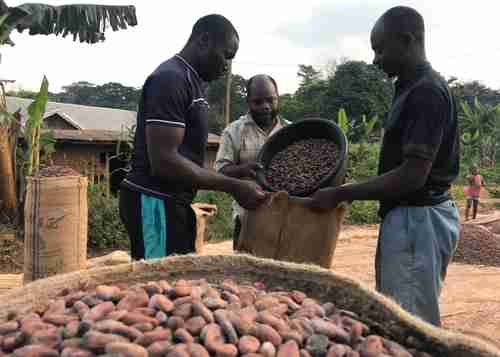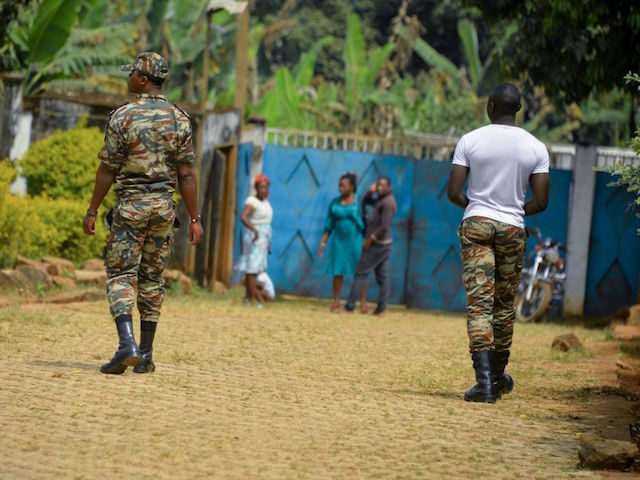This morning’s key headlines from GenerationalDynamics.com
- Cameroon crisis escalates as English-speakers flee to Nigeria to escape French-speakers’ violence
- Cameroon Catholic Church splits over government ‘barbarism’ and ‘growing genocide’
Cameroon crisis escalates as English-speakers flee to Nigeria to escape French-speakers’ violence

Anglophone Cameroon cocoa farmers have been forced to abandon their crops and flee the violence from the Francophone security forces (Reuters)
There are fears that the crisis in Cameroon’s Anglophone (English-speaking) regions is spiraling out of control, leading to a refugee emergency and possibly shutting down cocoa production, an important part of Cameroon’s economy.
Tens of thousands of people from the Southern Cameroons, as the Anglophone provinces of Cameroon are known, have been forced to flee across the border into Nigeria in the last three months, to escape increasingly brutal violence by Francophone security forces of the country’s despotic Francophone leader, 84-year-old Paul Biya, who has been in power 37 years.
Even thousands of cocoa farmers have been forced to abandon their crops and flee to larger towns or to Nigeria. Normally, they produce more than 100,000 tonnes of beans, nearly half of the country’s output.
The violence started in 2016, but at the start was almost entirely one-sided violence, with the Francophone security forces violently attacking peaceful Anglophone protesters.
In 2016, the peaceful protests began with claims by Anglophone lawyers that the legal and court systems are biased toward Francophones, with many laws passed without even being translated into English. Anglophone teachers joined in, protesting that all courses in the schools had to be taught in French and that any use of English was forbidden. The Francophone police responded by severely beating several protesters and shooting two of them dead.
Violence by Francophone security forces grew during 2017 and took a particularly dangerous turn on September 22, when pro-Anglophone activist forces began using small bombs to target local security forces. On October 1, separatists staged a massive march and declared the independence of Ambazonia. In the increasingly violent Francophone government crackdown that followed, hundreds of people were arrested and helicopter gunships were used to fire on innocent civilians and kill them, resulting in the mass flight of refugees into Nigeria.
Nigeria is being increasingly drawn into the Cameroon crisis, as Cameroon Francophone security forces have been illegally crossing the border into Nigeria to pursue and arrest refugees fleeing the violence.
On January 5, armed Nigerian security forces stormed a hotel in Nigeria’s capital city, Abuja, where Cameroonian activists were meeting, and arrested 15 men and held them in secret custody for over a week. It is feared that Nigerian authorities will extradite the activists to Cameroon, where they will be held without trial and tortured. This has caused a debate by legislators and human rights activists within Nigeria itself, who say that the arrests were in violation of Nigerian law and that deporting them would be a violation of international law.
According to Jeffrey Smith of nonprofit Vanguard Africa:
With elections due later this year, and with President Biya’s increasing unpopularity, this is a potentially explosive situation that merits much more attention than it has been receiving, namely from regional leaders who should, in theory, have an interest in containing the regional unrest.
Presidential elections are scheduled for October. 84-year-old Biya is expected to run again, and to use corruption and force to rig the elections to make sure he wins. Quartz and Reuters and Premium Times (Nigeria) and Amnesty International
Cameroon Catholic Church splits over government ‘barbarism’ and ‘growing genocide’
The violence in the Anglophone regions of Cameroons has resulted in a significant split in Cameroon’s Catholic Church, with accusations being launched between Anglophone bishops and Francophone bishops.
On October 4 of last year, the Anglophone Bishops issued a declaration, excerpted as follows:
We also condemned in very unequivocal terms the violence perpetuated by some groups of young people on the one hand and the acts of brutality, torture, inhuman and unjustified treatment meted out to some of our youths by the Forces of Law and Order on the other hand. We called on the Government to restrain such barbaric action of the Forces of Law and Order and to bring to justice those of them who had been irresponsible, so that peace may reign.
…
Friday, 22nd September 2017, was a very significant turning point. … [A] huge population of men, women, youths, old and young, and even children turned out on the streets of many towns and villages of the North West and South West Regions to demonstrate peacefully and express their right to self-determination. This peaceful march of mostly innocent citizens, carrying peace plants and shouting “No violence! No violence!” and defying the Forces of Law and Order, should have sent home to the authorities a message of the fact that it was not just a handful of people outside the country calling for this restoration. While some of the Forces of Law and Order, reading the signs of the times, did not react violently, others instead of using their guns to protect citizens, shot live bullets at unarmed civilians, killing some and maiming others.
…
We condemn in the strongest terms possible the barbarism and the irresponsible use of firearms against unarmed civilians by the Forces of Law and Order, even if they are provoked. The divine injunction: “Thou shalt not kill!” remains valid even in such circumstances. We call on the Head of State of the Republic of Cameroon, the Commander in Chief of the Armed Forces, to stop the bloodbath and genocide that has skillfully been initiated in the North West and South West Regions. Mr. Kofi Annan, Former Secretary General of the United Nations Organization, said that “a genocide begins with the killing of one man – not for what he had done – but for who he is”. The statement by the Minister of Communications, the Spokesperson for the Government, that some Anglophone Cameroonians are “terrorists” is a subtle call for what can be described as “ethnic cleansing” or a genocide as all Anglophone Cameroonians are now considered as ‘terrorists’ and as such they qualify for elimination, just because they are Anglophones! We need to stop the imminent genocide!
…
At the moment, the Anglophone Problem can no longer be taken lightly or ignored. It needs urgent attention, to avoid the growing genocide. People have lost loved ones to brutal killings and do not even know where some of their corpses are now. Every individual who is killed increases the number of aggrieved persons and families, resentment and anger, which are very difficult to address.
Francophone bishops played down this statement by ignoring the issues, but making a general condemnation of all violence, such as this by Francophone Archbishop Samuel Kleda:
In the name of our common citizenship, brotherhood and humanity, the defense of legitimate interests must go hand in hand with social harmony, which is what is being sought … Violence, regardless of its source, does not build, it destroys.
However, this infuriated Anglophones, who saw this as trying to evade the issues by lumping them together with all the other problems in Cameroon.
Anglophone Father Gerald Jumbam wrote a letter to Kleda, saying:
[Cameroonians by virtue of their history] cannot be loyal subjects to the despicable and tyrannous Yaoundé government. Archbishop, you speak of Decentralization and you offer us it as the best gift you think fitting for the resolution of this crisis? We are determined to decline a gift so laden with spurious promises and deceitful propensities.
IDN and Bareta News (6-Oct-2016) and Crux Now
Related Articles
- Cameroon’s English-speaking provinces on the verge of full-scale violence (04-Dec-2017)
- Deadly violence increases in English-speaking regions of Cameroon (12-Nov-2017)
- Cameroon police shoot and kill English-speaking protesters on Sunday (02-Oct-2017)
- Cameroon’s army to force English-speaking children to attend school (31-Aug-2017)
- Cameroon: One person killed in English-speaking vs French-speaking civil unrest (23-Nov-2016)
KEYS: Generational Dynamics, Cameroon, Southern Cameroons, Paul Biya, Anglophones, Francophones, Nigeria, Jeffrey Smith, Vanguard Africa, Archbishop Samuel Kleda, Father Gerald Jumbam
Permanent web link to this article
Receive daily World View columns by e-mail

COMMENTS
Please let us know if you're having issues with commenting.